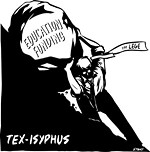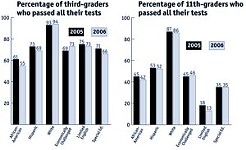Pay, Performance, Politics, and Education
Perry offers incentive pay, but only to a tiny handful of teachers
By Rachel Proctor May, Fri., Nov. 11, 2005
"This is a distraction from the fact that these guys have failed five times now to address school funding," said Louis Malfaro, head of AISD teacher's union Education Austin, referring to legislative efforts to replace the current school finance system. "We're dying out here."
Incentive pay was one of the elements strongly pushed by GOP leadership in their school finance plan, which belly flopped when a contingent of renegade Republicans joined Democrats in opposing it. While the concept raises the specter of teacher pay tied to students' performance on standardized tests, Chris Patterson of the conservative Texas Public Policy Foundation points out that incentive pay is not a "monolith." Rather, the schools receiving these grants could offer stipends for extra duties, like mentoring, or beefier checks for teachers in hard-to-staff subjects, like math or science; Patterson would even support a system that rewards increases in test scores over the previous year, provided it doesn't reward overall high scores. She believes that rewarding the best teachers will enhance the professionalism of the field and help fight the rapid, constant turnover that plagues Texas schools. "I think it's really important to keep in mind that teachers need a better pay system as well as better pay," she said.
Teacher groups, however, argue that in a state where teacher salaries lag about $6,000 below the national average, better pay needs to come first. Patterson argued that schools already have plenty of money they could pay teachers if they simply "prioritize" – such as through the requirement that school districts spend 65% of their budgets in the classroom, another failed idea from the Legislature that Perry's pen swooped into existence this fall. Teacher groups note, however, that it won't work to simply "reprioritize" money away from nurses, counselors, food service, and other nonteaching school staff – schools need new money, they say. The Texas Federation of Teachers, therefore, complained that Perry's incentive pay proposal is a "drop in the bucket" that would help teachers at one-eighth of 1% of Texas' 7,908 schools.
While teacher groups are often painted as stodgy old unions opposed to better living through competition, Malfaro of Education Austin insisted that his group is not opposed to incentive pay, such as rewards for teachers in hard-to-staff positions. He worries, however, that standardized test scores would be the primary measure. "All we're hearing out of [the Republican leadership] is, 'We want to pay individual teachers based on how kids this year do on their TAKS tests.' That's a loser," he said. "All it does is incent teachers to go to schools where students are already doing well."
Beyond Perry's plan, these arguments will no doubt wage anew when the Legislature meets for round six of the rumble in the school finance jungle. Perhaps it's time for an executive order dictating that nobody gets paid until they pass something.
Got something to say on the subject? Send a letter to the editor.










